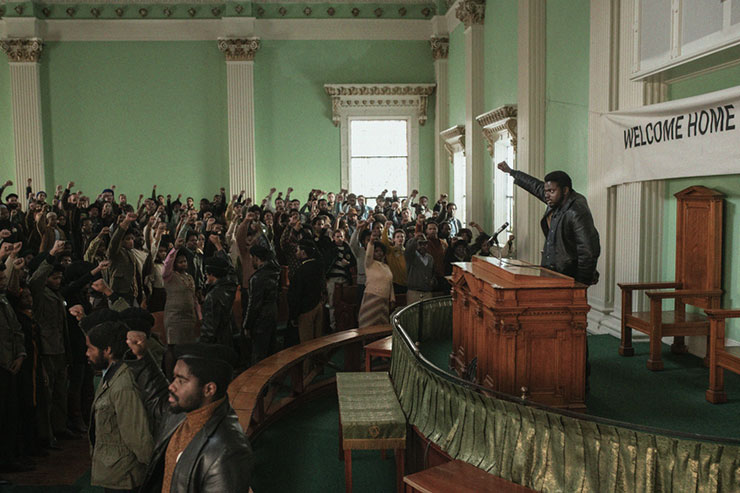
Daniel Kaluuya (right) as Chairman Fred Hampton in “Judas and the Black Messiah,” a Warner Bros. Pictures release. Photo courtesy Warner Bros. Entertainment.
It feels like an eternity, but once upon a time, not as long ago as you might think, people went to the movies in healthy numbers to see cinema that was unabashedly political in nature. These films, often put together by directors with a commitment to lay bare what they perceived as Uncle Sam's misdeeds, told stories ripped from the headlines, or chronicled events in the past that were probably not being covered in classrooms.
Let us take a moment of silence to mourn the steady demise of this once thriving genre. It lives on in streaming platforms or, for those antiquated folks like yours truly, productions made for cable TV. But the days when visions of paranoia over governmental oppression dominated movie screens are, sadly, something younger moviegoers have never experienced in full.
Two movies coming out in theaters this weekend give viewers a taste of the halcyon days when directors like Alan J. Pakula, Sidney Lumet and Sydney Pollack cast big marquee stars to bring their urgent, sometimes nihilistic narratives to life. For Gen-Xers like myself, they recall in places the work of Oliver Stone and Spike Lee in the early to mid-1990s. Here they are, racking up enthusiastic responses and award nominations. Are these new releases worthy of their forebears? Let's take a closer look.
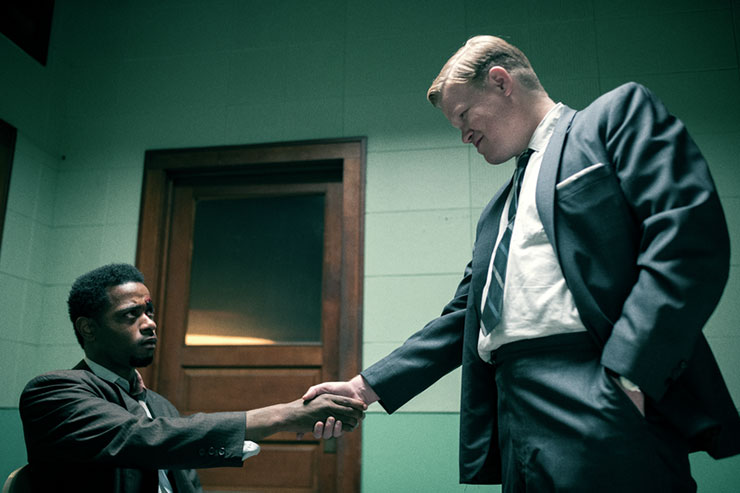
LaKeith Stanfield as Bill O'Neal and Jesse Plemons as Roy Mitchell in “Judas and the Black Messiah,” a Warner Bros. Pictures release. Photo courtesy Warner Bros. Entertainment.
“Judas and the Black Messiah”: This nervy and spiffy biopic, set in the late 1960s, opens with a scene that would feel right at home in the film noir releases its distributor, Warner Bros., churned out in big numbers some 80 years ago. A real slick character saunters into a Chicago bar and zeroes in on the owner of the sweet ride he spotted outside. The stranger flashes what looks at a quick glance like a bona fide FBI badge, then proceeds to confiscate the car keys and make his exit before the patrons catch on that they're being suckered.
But the days on the grift are about to come to an abrupt end for career criminal William O'Neal (LaKeith Stanfield). The po-po flash their lights just as he is making a quick getaway. Director Shaka King cuts to O'Neal, his face bruised and bloodied, as he looks up from his holding cell at the pasty white dude with the Cheshire Cat grin who has walked in. He's an FBI agent; the real McCoy, as it turns out. Roy Mitchell (Jesse Plemons) asks O'Neal how he got away with his con act. His answer cuts like a knife: “The badge is scarier than the gun.”
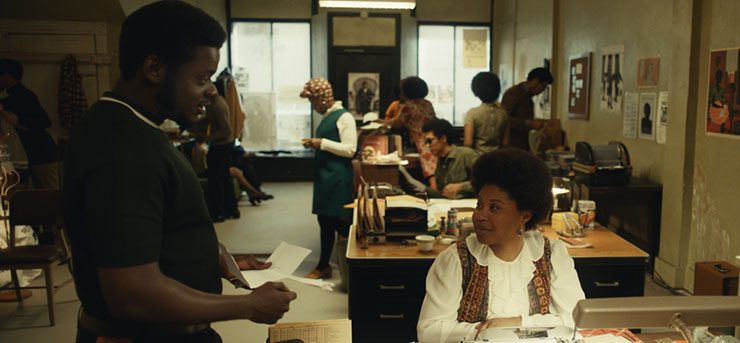
Daniel Kaluuya as Chairman Fred Hampton and Dominique Fishback as Deborah Johnson in “Judas and the Black Messiah,” a Warner Bros. Pictures release. Photo courtesy Warner Bros. Entertainment.
Mitchell lays his offer on the table: become a snitch for Uncle Sam, or do your time like any other Black man being screwed by the system. Though deeply skeptical of the devil's bargain being dangled before him, O'Neal agrees.
His target? Oh, no big deal. Just the chairman of the Illinois Black Panther Party.
A daunting task, to be sure, but O'Neal, not someone known for leading with his scruples, finds out his gift for deceit makes him an ideal candidate for the job. The informant befriends Chairman Fred Hampton (a galvanizing Daniel Kaluuya) and eventually finds himself climbing the ranks, standing by the young and charismatic leader's side as they walk into one lion's den after another to form the multicultural movement that became known as the Rainbow Coalition in the summer of '69.
King, making his studio feature directorial debut, depicts the growing friendship between the two men, oscillating between key moments in the Panthers' history and more personal scenes that show, for instance, Hampton engaging in an intellectually driven courtship with fellow revolutionary Deborah Johnson (“The Hate U Give's” Dominique Fishback). O'Neal, meanwhile, finds himself gaining the trust of reserved family man Mitchell, who himself is feeling the pressure from his boss, J. Edgar Hoover (Martin Sheen, relishing villainy) to produce results. It's Hoover who uses the phrase “Black Messiah” as a warning to his operatives to avoid letting someone like Hampton rise in stature.
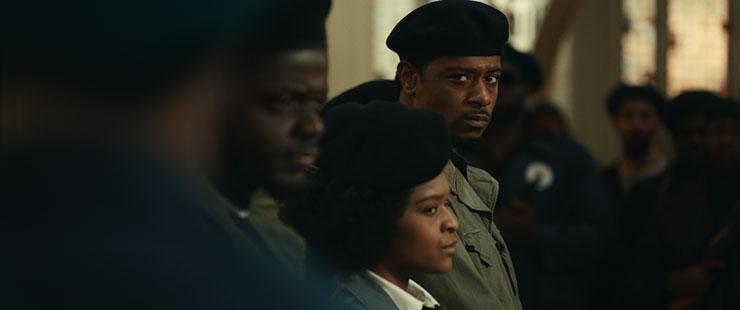
Daniel Kaluuya (right) as Chairman Fred Hampton, Dominique Thorne as Judy Harmon and LaKeith Stanfield as Bill O'Neal in “Judas and the Black Messiah,” a Warner Bros. Pictures release. Photo courtesy Warner Bros. Entertainment.
King, working from a screenplay credited to him and Will Berson, is covering a lot of territory, and he mostly succeeds in streamlining a fairly dense narrative with a large array of characters. He takes pains to include moments of levity, but the film too often plays like Spike Lee's “BlacKkKlansman” without the laughs and largely stripped of its warm camaraderie. The filmmaker is unapologetically out to educate his audience, and the results alternate between tense moments of peril and stilted dialogue that makes the movie feel like an R-rated book report on film.
Stanfield, reuniting with his “Get Out” co-star Kaluuya, made a big splash back in 2018 playing another impostor, a Black telemarketer with the gift of sounding white, in Boots Riley's vicious satire “Sorry to Bother You.” Here he is saddled with the lion's share of didactic lines, and his performance suffers as a result. You can see him struggling.
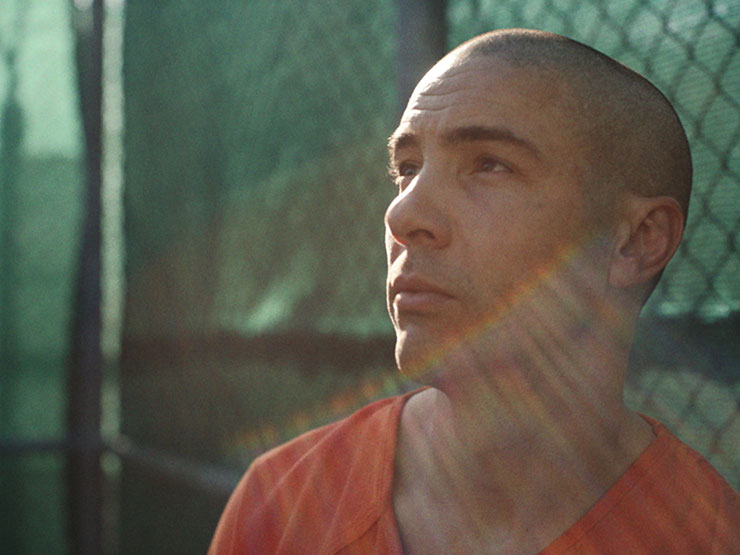
Tahar Rahim as Mohamedou Ould Slahi in “The Mauritanian.” Photo courtesy STX Films.
Kaluuya, on the other hand, gives a virtuoso star turn that alternates between quiet resolve and raise-the-roof conviction. The way the Oscar nominee's voice changes as he loses himself in Hampton is truly impressive. He's terrific, which makes one wonder why he's being submitted as Supporting Actor when he commands the screen with running time that falls just behind Stanfield's. Kaluuya is essentially Amadeus to Stanfield's Salieri. Imagine how nonsensical it would have been for Tom Hulce to have been submitted for Supporting Actor, and you get an idea how ludicrous the category fraud is in this case. Repeat after me, Warner Bros. publicists: co-leads. (Psst, Kaluuya's name is above Stanfield's in the credits for a reason.)
In addition to its strong cast, what helps keep the film from unraveling and propels it past the rough spots and preachy flourishes is cinematographer Sean Bobbitt's robust, fluid camerawork. The frequent Steve McQueen collaborator (“12 Years a Slave,” “Shame”) isn't quite able to shake off “Judas'” classroom lecture earnestness, but his widescreen compositions help bring to life a history lesson that hammers home its “defund the police” rhetoric with an engrossing sense of purpose, at least when it's not asking you to take your medicine.
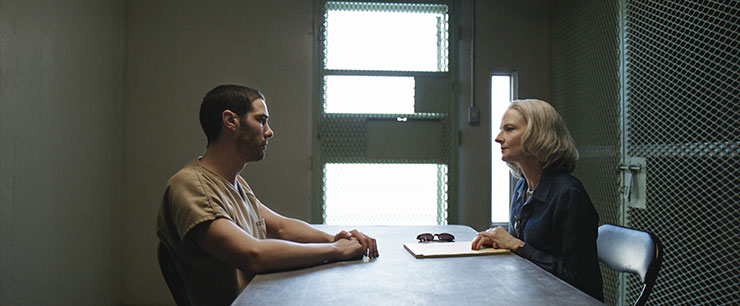
Tahar Rahim as Mohamedou Ould Slahi and Jodie Foster as Nancy Hollander in “The Mauritanian.” Photo courtesy Graham Bartholomew/STX Films.
“The Mauritanian”: We're not that far removed from the immediate ripple effects of 9/11, so we haven't forgotten how the U.S. clamored for justice for the nearly 3,000 lives taken on that Tuesday morning. What if this righteous quest involved depriving an innocent man of his freedom for well over a decade? That is the question explored in “Last King of Scotland” director Kevin Macdonald's absorbing legal drama.
The title character is Mohamedou Ould Slahi (“A Prophet's” Tahar Rahim), a Muslim man from northwest Africa who lived in Germany and Canada before he was taken into custody back home in November 2001, as his beloved mother looked on in dismay before becoming a speck barely visible from the rear window of the car that took her son away “for questioning.” He eventually ends up as Detainee 760 at the Guantanamo Bay detention camp.
Fast forward to early 2005, and Albuquerque-based criminal defense lawyer Nancy Hollander (Jodie Foster) agrees to take up Slahi's case, assisted by fellow attorney Teri Duncan (Shailene Woodley), much to the chagrin of the partners in her firm. “Since when did we start locking people up in this country without a trial?” she asks. At around the same time, U.S. Marines Lt. Col. Stuart Couch (Benedict Cumberbatch, uncomfortably trying on a Southern accent) is tapped to lead the prosecution as part of a “9/11 war court for enemy combatants held in Guantanamo.”
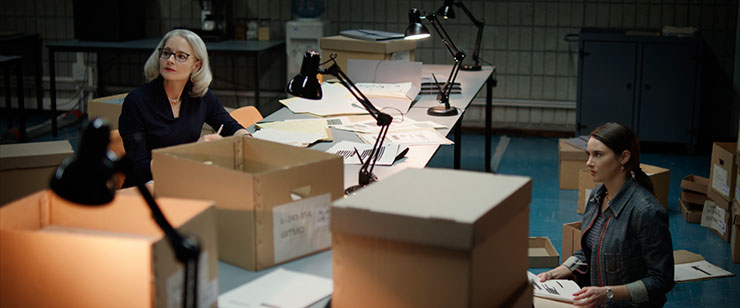
Jodie Foster as Nancy Hollander and Shailene Woodley as Teri Duncan in “The Mauritanian.” Photo courtesy Graham Bartholomew/STX Films.
At issue is whether or not Gitmo detainees have the right to cite habeas corpus, which would require the U.S. to show a legal basis for their detention and would enable the prisoners to bring their petition to a U.S. courtroom. It's something that could jeopardize the prosecution's case, since their aim is to argue that Slahi had a hand in recruiting the terrorists who took part in 9/11.
Hollander, who has devoted a sizable portion of her career representing clients involved in national security issues, is steely and no-nonsense, an ideal fit for Foster, who gets to rock a silver mane. Couch lost a close friend who was in one of the planes that hit the World Trade Center, which under normal circumstances would raise all sorts of conflict-of-interest red flags. A miscast Cumberbatch, by contrast, attempts to underplay his by-the-book character, with mixed results.
Rather than portray Hollander and Couch's work on the case as an impending clash of titans the way a filmmaker like, say, Aaron Sorkin would, Macdonald is more interested in what the rivals have in common, such as running into resistance from the military when researching what happened to Slahi while in custody. The lawyers eventually discover the detainee was subjected to what was coined at the time “enhanced interrogation techniques.” (Remember how ubiquitous that phrase became?)
The film, based on Slahi's 2015 memoir “Guantánamo Diary,” is actually more engaging the further away it stays from the sensationalist torture imagery. Kudos to Macdonald for delaying those scenes as long as possible while never shying away from Slahi's suffering. And yet, those scenes turn “The Mauritanian” into a more mundane undertaking. A foray into surrealism to depict Slahi's hallucinations is particularly ill-conceived. The other, more naturalistic flashback sequences, shot by cinematographer Alwin H. Küchler in the Academy aspect ratio, are considerably more effective. What keeps things interesting are the details on the edges of the screen, like a glimpse into a souvenir shop inside Gitmo, or how Slahi was able to learn English by listening to his guards.
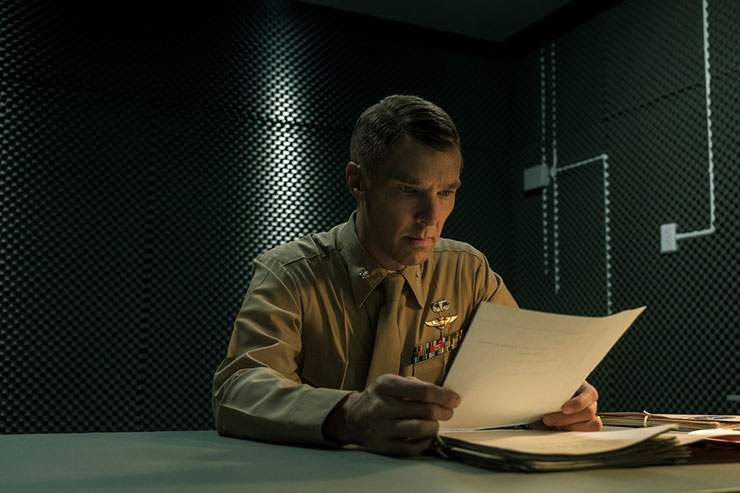
Benedict Cumberbatch as U.S. Marines Lt. Col. Stuart Couch in “The Mauritanian.” Photo courtesy Graham Bartholomew/STX Films.
Despite the mountain of exposition that the screenplay, credited to Michael Bronner, Rory Haines and Sohrab Noshirvani, piles on the viewer, “The Mauritanian” works more often than not, because Macdonald prioritizes Slahi's humanity. He's not just a piece on a political chess board. A scene late in the film when the tough-as-nails Hollander softens toward her client is quite moving, not only because of how well Foster and Rahim perform it (it's Foster's finest moment in a long time), but because it's an emotional payoff that Macdonald has quietly engineered. The cumulative effect catches you off guard, He's crafted a portrait of systemic injustice where the characters come before the politics. Make sure to stay for the end credits for a touching look at the real Slahi, Hollander and Duncan.
“Judas and the Black Messiah” had its premiere during the 2021 Sundance Film Festival. It is now showing in theaters across the country, including local Dolby Cinema engagements at AMC Aventura and AMC Sunset Place. For the next month, it also also available to stream on HBO Max. “The Mauritanian” is currently showing in theaters only, including at CMX Brickell City Centre and The Landmark at Merrick Park in Coral Gables. Its distributor, STX Films, plans to make it available on premium video on demand in the near future.




